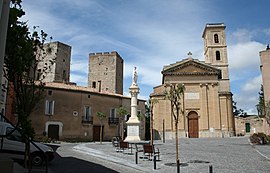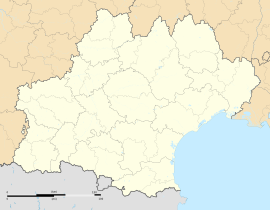Cournonterral
Appearance
Cournonterral | |
|---|---|
 Tower and Sainte-Croix church | |
| Coordinates: 43°33′32″N 3°43′12″E / 43.5589°N 3.72°E | |
| Country | France |
| Region | Occitania |
| Department | Hérault |
| Arrondissement | Montpellier |
| Canton | Pignan |
| Intercommunality | Montpellier Méditerranée Métropole |
| Government | |
| • Mayor (2008–2014) | Thierry Breysse |
| Area 1 | 28.62 km2 (11.05 sq mi) |
| Population (2013) | 5,826 |
| • Density | 200/km2 (530/sq mi) |
| Demonym | Cournonterralais |
| Time zone | UTC+01:00 (CET) |
| • Summer (DST) | UTC+02:00 (CEST) |
| INSEE/Postal code | 34088 /34660 |
| Elevation | 29–320 m (95–1,050 ft) |
| 1 French Land Register data, which excludes lakes, ponds, glaciers > 1 km2 (0.386 sq mi or 247 acres) and river estuaries. | |
Cournonterral is a commune in the Hérault department in southern France.

Population
| Year | Pop. | ±% |
|---|---|---|
| 1962 | 1,887 | — |
| 1968 | 2,088 | +10.7% |
| 1975 | 2,460 | +17.8% |
| 1982 | 3,062 | +24.5% |
| 1990 | 4,095 | +33.7% |
| 1999 | 5,069 | +23.8% |
| 2008 | 5,664 | +11.7% |
Residents are known as Cournonterralais.
Festival
The town is known for an annual festival known as Pailhasses. The festival has taken place in Cournonterral every Ash Wednesday since 1346. In that year, residents held off rivals from their neighbouring village, thus putting an end to a long dispute over gathering firewood. Since that time, Cournonterral residents have relived the event every year. The Paillasses (people in straw-stuffed tops) chase 'the white men' through the streets of the town with old rags and tissue soaked in wine sediment. The 'white men' come from the town of Aumelas. [1]
See also
References
Wikimedia Commons has media related to Cournonterral.




